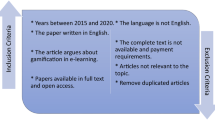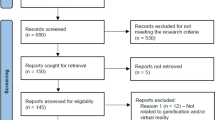Abstract
In recent years, growing interest has been seen in the application of gamification in education, which can be defined as the application of game design elements in learning activities. The goal of gamification is to motivate students by creating an engaging learning experience that can keep them focused on learning tasks in the classroom. However, gamification is a major challenge for education, particularly in higher education institutions. The present work presents 11 gamification activities for teaching pharmacology in a medical course. The moment at which the activity fits best in the class, the ways in which the activity can be applied, and the advantages and difficulties that are associated with each game in the classroom are presented. We report student evaluations of the gamification learning activities. The use of these games fosters learning, increases academic engagement, and makes classes more enjoyable.

Similar content being viewed by others
References
Achike, F. I. (2010). Teaching pharmacology in an innovative medical curriculum: Challenges of integration, technology, and future training. The Journal of Clinical Pharmacology, 50, 6–16.
Alexander, R.J. (2008). Culture, dialogue and learning: notes on an emerging pedagogy, in Mercer, N. and Hodgkinson, S. (ed) Exploring Talk in School, Sage, pp 93–114
Al-Fageh, B., Aljadhey, H., Mahmoud, M. A., Al-Fadel, N., Hassali, M. A., & Franklin, B. D. (2018). Perceived causes of prescribing errors by physicians: A qualitative study. Tropical Journal of Pharmaceutical Research, 17, 1415–1422.
Amrein-Beardsley, A. (2008). Methodological concerns about the education value-added assessment system. Educational Researcher, 37, 65–75.
Bucat, R. (2005). Implications of chemistry education research for teaching practice: Pedagogical content knowledge as a way forward. Chemical Education International, 6, 1–2.
Clapper, T. C. (2009). Moving away from teaching and becoming a facilitator of learning. PAILAL, 2, 1–6.
Dean, B., Schachter, M., Vincent, C., & Barber, N. (2002). Causes of prescribing errors in hospital inpatients: A prospective study. Lancet, 359, 1373–1378.
Dicheva, D., & Dichev, C. (2016). An active learning model employing flipped learning and Gamification strategies. Workshop on Intelligent Mentoring Systems, 1, 1–6.
Engels, F. (2018). Pharmacology education: Reflections and challenges. European Journal of Pharmacology, 833, 392–395.
Ercan, O. (2004). Active learning as a learning process. Education in the light of science and mind, 1, 54–55.
Gelisli, Y. (2009). The effect of student-centered instructional approaches on student success. Procedia - Social and Behavioral Sciences, 1, 469–473.
Gotardelo, D. R., Bollela, V. R., Souza, A. P. G., Barros, D. P., Balbino, J. M., & Ballester, D. (2017). Role-play preceded by fieldwork in the teaching of pharmacology: From “raw sap” to “elaborated sap”. Revista Brasileira de Educação Médica, 41, 372–378.
Krähenbühl-Melcher, A., Schlienger, R., Lampert, M., Haschke, M., Drewe, J., & Krähenbühl, S. (2007). Drug-related problems in hospitals: A review of the recent literature. Drug Safety, 30, 379–407.
Kudryashova, A., Gorbatova, T., Rybushkina, S., & Ivanova, E. (2015). Teacher’s roles to facilitate active learning. Mediterranean Journal of Social Sciences, 7, 460–467.
Laing, R., Hogerzeil, H., & Ross-Degnan, D. (2001). Ten recommendations to improve use of medicines in developing countries. Health Policy and Planning, 16, 13–20.
Landers, R. N. (2014). Developing a theory of Gamified learning. Simulation & Gaming. Simulation & Gaming, 45, 752–768.
Landers, R. N., Bauer, K. N., Callan, R. C. & Armstrong, M. B. (2015). Psychological theory and the gamification of learning. Gamification in education and business. New York: Springer, 165-186.
Silva, R. J. R., Rodrigues, R. G., & Leal, C. M. P. (2019). Gamification in management education: A systematic literature review. Brazilian Administration Review, 16, 1–31.
Acknowledgements
The authors thank the students of T1 of the medical course at Paranaense University for their engagement and mutual construction of this methodology, Cinthia Aparecida, Rafael Jaillot, Karine Sanches Santos, and Sirlei Fatima Lima Morais for their assistance, and Michael Arends for proofreading the manuscript.
Funding
This research was supported by Diretoria Executiva de Gestão da Extensão Universitária, Paranaense University (UNIPAR).
Author information
Authors and Affiliations
Corresponding author
Ethics declarations
Conflict of interest
The authors declare that there are no conflicts of interest in this research.
Additional information
Publisher’s note
Springer Nature remains neutral with regard to jurisdictional claims in published maps and institutional affiliations.
Rights and permissions
About this article
Cite this article
dos Reis Lívero, F.A., da Silva, G.R., Amaral, E.C. et al. Playfulness in the classroom: Gamification favor the learning of pharmacology. Educ Inf Technol 26, 2125–2141 (2021). https://doi.org/10.1007/s10639-020-10350-w
Received:
Accepted:
Published:
Issue Date:
DOI: https://doi.org/10.1007/s10639-020-10350-w




